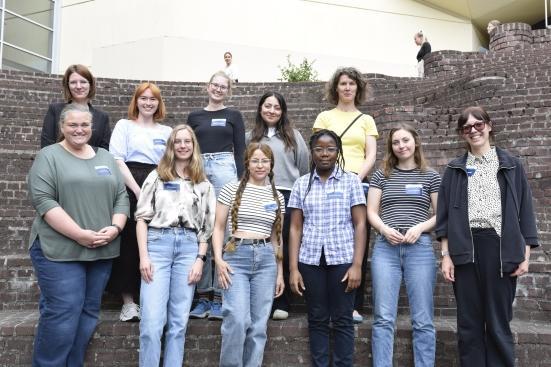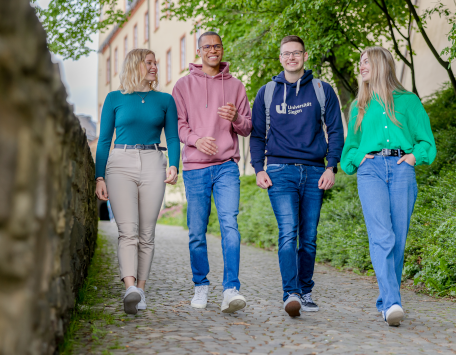Opening doors for other women and keeping them open

Looking forward to the start of the mentoring program (from left, top): Dr. Inga Haase (coordinator), Ronja Müller-Späth, Jasmin Laura Gerfen, Emine Aşcı, Dr. Julia Kernbach. Below: Dr. Annika Schebesta, Laura Graewert, Parvin Ghadamighalandari, Dr. Natacha Kuete Meli, Jessica Kuhlmann, Dr. Rebecca Weber (coordinator).
Opening doors for other women and keeping them open
Experiences, successes, advice: The conclusion of a year in the Women's Mentoring Program Siegen (FraMeS) is always an opportunity for reflection. A group of female academics finishes the program, which is offered at the University of Siegen. New participants join the program. The event offers the opportunity to exchange ideas, pass on ideas and encourage others. "Because," said Dr. Anna Karger-Kroll, former FraMeS participant, in her welcoming speech, "there was often the doubt: Am I good enough?" The exchange with others as part of the program helped her to let go of this thought. "I was disillusioned afterwards in a positive sense." Mentoring offers a valuable, helpful space for female scientists. The program has been running successfully at the University of Siegen for 15 years. Coordinators Dr. Rebecca Weber and Dr. Inga Haase were delighted not only to present the certificates to the graduates, but also to welcome ten new participants.
Traditionally, in addition to the awarding of certificates, the graduation event always focuses on a keynote speech on the main topic of the new year. This year, literary scholar Dr. Alessandra Boller, who was once a FraMeS participant herself, inspired the participants with her lecture "A woman must have money and a room of her own if she is to write fiction" - Visibility, Role Models and Women's Solidarity in Literature. Using Virginia Woolf as an example, she took those present "on a journey through time".
A room to herself. That was the wish, goal, demand and title of an essay by the English writer in 1929, a text that is considered a classic of the women's movement. "What does Virginia Woolf still have to say to us today?" asked Dr. Alessandra Boller. Too little visibility, not networked and therefore powerless in the literary world: Woolf and other female writers of the 19th and 20th centuries struggled with this. "But these are also the issues that we talk about again and again today, for example at FraMeS," says Dr. Alessandra Boller. The question of visibility, the analysis of power structures, the importance of networks and role models are still relevant. "Virginia Woolf opened doors for many female authors - but also for us," explained Dr. Alessandra Boller. "So we should also open doors and hold them open for other women." A principle that FraMeS builds on.
They received their certificates: Dr. Lia Durán Mogollón, Dr. Marie Neubert, Dr. Shanmugapriya Periyannan, Anne Hildebrand, Diana Grüger, Mirja Beck, Lina Vandré, Madlen Kneile, Lina Gebhardt, Marta Maria Röder, Moonum Zehra, Setareh Orangpour, Hannah Jestädt, Inga Schuppener, Nastaran Farah Bakhsh, Eva Bordin.
The participants of the 15th year are: Eva Schramm, Jasmin Laura Gerfen, Jessica Kuhlmann, Laura Graewert, Parvin Ghadamighalandari, Emine Aşcı, Ronja Müller-Späth, Dr. Annica Schebesta, Dr. Julia Kernbach, Dr. Natacha Kuete Meli.
